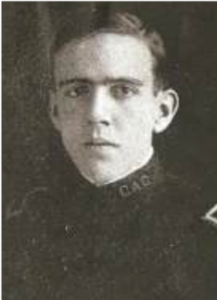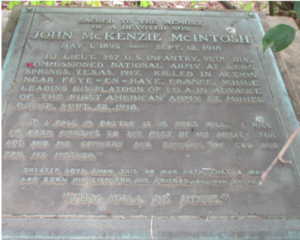Scroll of Honor – John McKenzie McIntosh
One of the Most Promising Young Men
John McKenzie McIntosh of Columbia was noted for his “ready wit and congenial nature” according to the 1914 edition of Taps.
“Mc” McIntosh came to Clemson Agricultural College when the campus was still new,  arriving in the late summer of 1910 as a member of the Class of 1914. Mc, who wanted to be a chemist, pursued a double major in chemistry and agriculture. He also took part in the increasing number of extracurricular activities at the young college. In addition to associating in academic clubs with the other boys in his two majors, Mc was a member of the Senior Dancing Club, the Calhoun Literary Society, the Richland County Club and the Columbia City Club. He also served as a lieutenant in the Corps of Cadets.
arriving in the late summer of 1910 as a member of the Class of 1914. Mc, who wanted to be a chemist, pursued a double major in chemistry and agriculture. He also took part in the increasing number of extracurricular activities at the young college. In addition to associating in academic clubs with the other boys in his two majors, Mc was a member of the Senior Dancing Club, the Calhoun Literary Society, the Richland County Club and the Columbia City Club. He also served as a lieutenant in the Corps of Cadets.
Upon graduation, McIntosh continued his formal education by enrolling in the University of South Carolina. He received his master’s degree in 1916 and soon took a position as chemist and head refiner for Fidelity Oil Company in Houston, Texas.
At 8:30 in the evening on April 2, 1917, President Woodrow Wilson appeared before a joint session of Congress to request a declaration of war on Germany. Wilson had been pushed into the step by the Germans’ unrestricted submarine warfare that was targeting—and sinking—US merchant ships trading with Britain. Congress declared war two days later.
Mc McIntosh immediately volunteered for Army service and was sent for officers’ training to Leon Springs, Texas, where on August 27 he was commissioned as a first lieutenant. McIntosh was ordered to Camp Travis near San Antonio where the 90th Division was organized that fall. The following June, the division embarked for Europe, reaching Liverpool on July 4. After two weeks of training in France, McIntosh and his regiment, the 357th Infantry, moved up to the front lines and into the trenches in time for the first all-American offensive of the war near St. Mihiel.
It was while leading 1st Platoon, Company A in the vanguard of the offensive that First  Lieutenant McIntosh was killed by German machine gun fire on September 12, 1918. He was posthumously awarded the Silver Star.
Lieutenant McIntosh was killed by German machine gun fire on September 12, 1918. He was posthumously awarded the Silver Star.
In its obituary on the young Columbian, The State newspaper called him “one of the most promising young men” of the city. His remains were returned to Columbia in 1921 and were buried in St. Peter’s Catholic Church Cemetery.
For more information about First Lieutenant John McKenzie McIntosh see: https://soh.alumni.clemson.edu/scroll/john-mckenzie-mcintosh/
For additional information on Clemson University’s Scroll of Honor visit: https://soh.alumni.clemson.edu/
